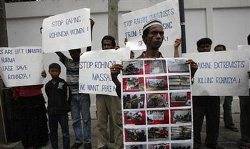Myanmar security forces have killed, raped or carried out mass arrests of Rohingya Muslims after deadly sectarian riots in the northeast in June, a rights group has said, adding the authorities had done little to prevent the initial unrest.
Aid workers were blocked and in some cases arrested in a government crackdown on the largest group of stateless people in Southeast Asia, New York-based Human Rights Watch said in a report on Wednesday.
The report comes after a week of arson and machete attack by both ethnic Rakhine Buddhists and Rohingyas in Rakhine state.
Based on 57 interviews with Rakhines and Rohingyas, the report seeks to shed light on a conflict that exposed deep-rooted communal animosity and put the spotlight on promises by the civilian government in office since 2011 to protect human rights after decades of brutal army rule.
"Burmese security forces failed to protect the Arakan [Rakhine] and Rohingya from each other and then unleashed a campaign of violence and mass round-ups against the Rohingya," said Brad Adams, Asia director at Human Rights Watch.
"The government claims it is committed to ending ethnic strife and abuse, but recent events in Arakan State demonstrate that state-sponsored persecution and discrimination persist."
Foreign Minister Wunna Maung Lwin said on Monday the authorities had exercised "maximum restraint" in restoring law and order and that the rioting was not fuelled by religious persecution.
He rejected what he said were attempts to "politicize and internationalize the situation as a religious issue", adding that the government was eager to promote "racial harmony among different nationalities".
In veiled criticism of the United States and European Union, which praised the government for its handling of the unrest, Adams said the international community had been "blinded by a romantic narrative of sweeping change" in Myanmar.
Forced resettlement
The country formerly called Burma has a diverse ethnic and religious make-up, but the Rohingya Muslims are not included by the government.
There are at least 800,000 Rohingyas in the country but they are not recognized as one of its ethnic groups.
Neighboring Bangladesh does not accept them and pushed boatloads back out to sea when they tried to flee the unrest.
Myanmar President Thein Sein said in June the government was only responsible for third-generation Rohingyas whose families had arrived before independence in 1948 and that it was impossible to accept those who had "illegally entered" Myanmar.
He recommended that the United Nations refugee agency UNHCR take care of them in camps or "resettle them" in third countries.
UNHCR chief Antonio Guterres replied it could only resettle refugees that fled from one country to another.
'Virulent hatred'
The riots followed two brutal incidents in Rakhine state: the May 28 rape and murder of a Rakhine woman by three Rohingya males, who were sentenced to death, and the June 3 lynching in response of 10 non-Rohingya Muslims travelling on a bus.
Human Rights Watch said police and troops did not intervene to stop the mobs from beating the Muslims to death. During the riots that followed, it said some Rohingyas who tried to flee or put out fires at their homes were shot at by paramilitaries.
It called for the government to end abuses, grant full humanitarian access and invite in international monitors. Access to the area remains restricted.
Michael Vatikiotis, the Asian director for the Center for Humanitarian Dialogue, said that while the primary factor in the recent violence is "the virulent hatred of the Rohingya people by the Rakhinese", this is by no means an isolated issue.
Vatikiotis adds that claims of the state of emergency in the country being used as a cover for various abuses are "very easy to make," but says judgment should be reserved until access into the area is once again granted.
"It is very difficult to make an objective assessment because of the lack of access to the region."
PHOTO CAPTION
Rohingya people living in Thailand hold posters and signs as they protest in front of Myanmar's embassy in Bangkok.
Source: Aljazeera.net


 Home
Home Discover Islam
Discover Islam Quran Recitations
Quran Recitations Lectures
Lectures
 Fatwa
Fatwa Articles
Articles Fiqh
Fiqh E-Books
E-Books Boys & Girls
Boys & Girls  Ramadan
Ramadan Fatwa Audios
Fatwa Audios Month of Mercy
Month of Mercy Women
Women Eed Al- Fitr
Eed Al- Fitr Food Recipes
Food Recipes Videos
Videos

 Prayer Times
Prayer Times












